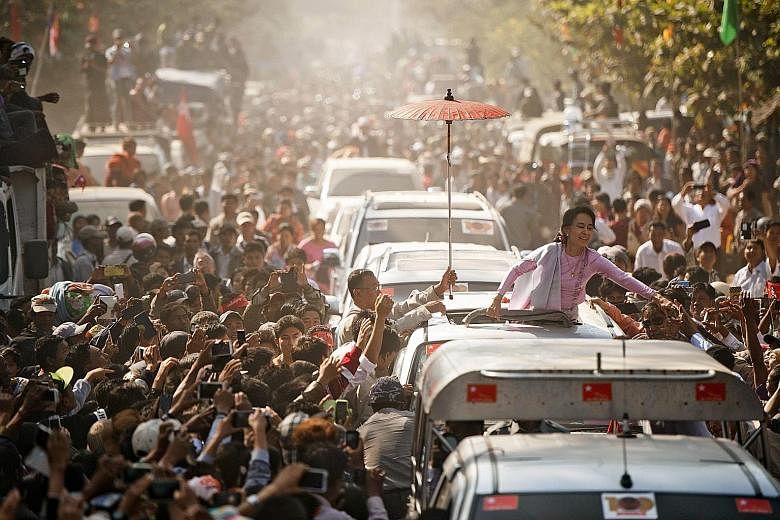Mainland South-east Asia is set for a year of uncertainty and potential friction as sensitive political transitions loom, especially in Thailand and Myanmar, and external economic factors, like the slump in commodity prices and China's slowdown, take the steam out of regional economies.
Vietnam is set for a party congress early this year, which will reshuffle the Politburo and install new leadership. While far from a transformational change, the leadership will have to manage fundamental issues, including reforms mandated by and associated with Hanoi's accession to the Trans-Pacific Partnership (TPP) trade agreement - some of which, like labour unions, go against the very grain of the one-party communist state.
But the mood is optimistic on the back of 6.7 per cent growth in gross domestic product last year - an eight-year high powered by exports and foreign investments.
Externally, dealing with an increasingly assertive China over the South China Sea will also be a critical diplomatic challenge for Vietnam. The South China Sea issue will continue to dog the 10-member Asean grouping as well. This year's chair will be Laos, which, while seen as drifting increasingly into China's orbit economically, will have to respect its old ally and regional power Vietnam politically.
Across the region, old incumbent establishments - in Thailand, Cambodia and Vietnam, for instance - are also facing civil society forces which are challenging their ability to change.
-
The year ahead
-
• Political transition looms for Myanmar and Thailand.
• Entrenched ruling regimes such as those in Vietnam and Cambodia face mounting challenges.
• Laos takes over as Asean chair, a big role for a small but resource-rich country still run by a relatively opaque communist party.
Only Myanmar stands out as a carefully calibrated compromise engineered by the regime itself.
Myanmar, which at the end of March will install its first elected civilian government in decades, is in for potentially its most crucial year since independence. Two key issues will occupy the country going forward, and the way they are managed will decide its future: civil-military relations under a National League for Democracy (NLD) government; and peace talks with armed ethnic minority groups.
If Myanmar succeeds in managing competing forces - some of which will actively undermine the NLD - it may turn out to be, as historian and author Thant Myint-U has pointed out, a "remarkably peaceful transition, engineered from within the old establishment, from military dictatorship to the far freer if still mixed political system we have today".
Many uncertainties remain, but "we need not be too cynical'', Dr Thant Myint-U said in an e-mail. "The motivation for the changes taking place is clearly the desire of nearly everyone, in the military establishment as well as the opposition, to see a different future for the country. All the energy behind current reform, the willingness to compromise, comes from the basic awareness that the Myanmar people deserve a lot better.''
-
A new year could mean new beginnings for nations looking for a fresh start. New leaders will be elected in the United States and the Philippines. But there is also a sense that more of the same is the way forward.
In an interview, Professor Thitinan Pongsudhirak, director of the Institute of Security and International Studies at Chulalongkorn University, said: "The overarching issue for the region is an ongoing trend of mounting challenges against entrenched incumbent regimes that have been around a long time and becoming increasingly untenable."
The incumbent regimes must make adjustments, he said, pointing to how the army in Myanmar allowed and accepted last year's Nov 8 general election and its outcome.
"In Vietnam and Laos, established regimes have been around a long time and have been successful at suppressing dissent and protests but eventually will have to face... popular demands for a greater voice as economic development makes more headway," he added.
In Cambodia, long-time Premier Hun Sen faces more immediate challenges from the opposition - which he must face in a general election in 2018 - but has reacted with coercion and repression.
"We will see more tension there,'' said Prof Thitinan.
Thailand faces the all-important transition in the monarchy, with 88-year-old King Bhumibol Adulyadej increasingly frail. There is muted but widespread anxiety over the looming transition, which will be a watershed moment for the kingdom. Against this backdrop, the royalist military regime is entrenching itself and has made clear it has no tolerance for dissent and is unlikely to cede any power before 2017.
"The incumbent regime is not yet willing to offer a viable alternative that can protect their interests, yet accommodate growing needs and grievances of a democratised electorate,'' Prof Thitinan said.
The Asean Economic Community came into being last Friday and this year will be a proving ground for the 10-nation grouping's ability to genuinely liberalise intra-regional trade, investment and labour flows. This will be important in boosting economic growth. But while important, the outcome will not be a big bang, analysts say.
Laos, as Asean chair, will host a series of high-level meetings, including of leaders from the United States, China, Japan and India. This will take place in a small but resource-rich country still run by a relatively opaque communist revolutionary party, which is poorly understood even inside Laos. Yet its chairmanship role, while probably minimalist due to its own lack of institutional capacity, will offer insights.
"The Asean chairmanship will bring Laos into a spotlight in a way it is not accustomed to,'' says Mr Michael Montesano, a visiting fellow at the Iseas-Yusof Ishak Institute. "This is an opportunity to learn more about Laos, including the question of China's influence."

